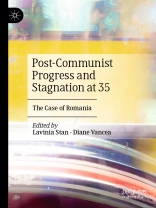This book examines Romania’s efforts to consolidate liberal democracy and market economy, as desired by the generation who effected change in 1989 and required by the European Union. The ousting of Nicolae Ceausescu, leader of an autarchic and nationalistic dictatorship, underscored the limitations of politically engineering change when rule of law is weak, institutions are misused, and intolerance and cheating are prevalent. Despite initial hopes, Romania’s transition combined progress and stagnation, missed opportunities, detours, unintended consequences, and success. The contributions illustrate the tenuous relationship between continuity and change in a country that is yet to catch up with its neighbors.
Tabela de Conteúdo
Foreword: Vladimir Tismaneanu.- Chapter 1: Introduction – Dennis Deletant.- Part I: Institutions and Elites.- Chapter 2: Institutional Choices and Weaknesses after 1989 – Florin Anghel.- Chapter 3: An Overview of Cabinet Demographics — Alexandra Horobet, Claudia Ogrean, Dana Alexandru and Robert Oprescu.- Chapter 4: The Eroding Force of Informal Rules: Romania between Democracy and Europeanisation — Clara Volintiru and Edit Zgut-Przybylska.- Chapter 5: Are We There Yet? Romania’s Semi-Peripheral Rule of Law — Mihaela Şerban.- Chapter 6: Protracted Transition: The Civilian Control over the Military and Intelligence — Marius Ghincea and Marian Zulean.- Part II: Civil Society and Its Values Chapter 7: Romanian Parties and Post-Communist Democracy — Sorina Soare and Mattia Collini.- Chapter 8: The Challenges of Political Protest and Democratic Representation — Radu Cinpoes.- Chapter 9: Political Anachronism and Elite Political Culture: The Lacunae Theory – Delia Popescu.- Part III: Change and Continuity in Areas of Life.- Chapter 10: Riding the Waves of Democratization: The Interminable Sea Sickness of Romania’s Media — Peter Gross.- Chapter 11: Change and Continuity in the Higher Education System — Razvan Zaharia, Rodica Milena Zaharia and Tudor Edu.- Chapter 12: Health and Citizenship in Post-Socialist Romania — Gerard Weber and Sabina Stan.- Chapter 13: Wild Capitalism with Political Clout — Lavinia Stan and Diane Vancea.- Part IV: Conclusion.- Chapter 14: Conclusion – Tom Gallagher
Sobre o autor
Lavinia Stan is Professor of Political Science and Director of the Center for Post-Communist Studies at St. Francis Xavier University, Canada.
Diane Vancea is Professor of Economics and International Affairs and President of the Senate of the University “Ovidius” in Constanta, Romania.












